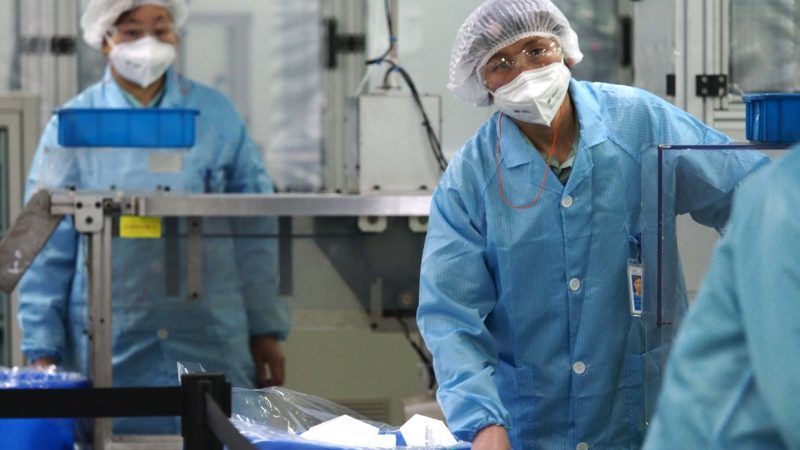FDA Will Lift Restrictions on Face Mask Imports, Toppling Another Pointless Regulation
Health care workers will now be allowed to use the Chinese-certified KN95 masks, which are equivalent to the N95 masks that are in short supply.

After facing criticism for its policies that limited the availability of critically needed face masks, the Food and Drug Administration (FDA) now says it will allow KN95 masks to be bought by hospitals and used by health care workers.
The KN95 designation is a Chinese government standard that is widely considered to be equivalent to the N95 masks approved by American regulators. Guidance issued by the Centers for Disease Control (CDC) says the KN95 masks are "suitable alternatives" to the N95 mask when medical supplies are running short, and research from Minnesota-based 3M Corporation found that KN95 masks are "reasonable to consider….as equivalent" to the N95 variety.
With the supply of N95 masks running low due to a global surge in demand as the COVID-19 outbreak worsens, the FDA issued an Emergency Use Authorization (EUA) on March 24 to allow American health care workers to use masks made to specifications for five other countries (Australia, Brazil, Japan, South Korea, and Mexico) and Europe. But the Chinese-approved KN95 masks were left off the list.
Despite that, importers were finding ad hoc methods of getting the KN95 masks into the United States. Even though hospitals and other health care providers were forbidden from buying them, the KN95 masks could be sold to the general public or donated to first responders.
On Friday, the FDA issued new guidance that will allow health care workers to use KN95 masks too. The new guidance comes in response to "continued respirator shortages," the FDA said.
In situations where N95 masks are not available, the FDA said, the agency would not block "the importation and use of respirators without an EUA, including KN95 respirators," as long as those masks are included on the CDC's list of respirator alternatives during the COVID-19 pandemic. "Although not required, if a KN95 respirator does not have an EUA, importers may want to take appropriate steps to verify authenticity of these products," the FDA said.
But while the FDA is saying they will not block imports, it remains unclear whether masks lacking FDA certification will carry liability issues for health care providers.
"Our lawyer warned us we could get in trouble with these KN95s," Shawn Smith, a Santa Monica, California, entrepreneur who has been attempting to bring masks into the country to sell to hospitals, told Buzzfeed News on Thursday. "He said we could get sued or even face criminal charges."
Getting full FDA approval can't happen in a timely manner. As Reason's Christian Britschgi reported last week, getting new suppliers approved to produce FDA-compliant gear can take weeks.
William Beaton of Miami Medx, a medical supply firm that imports masks, surgical gear, and other health care equipment, says the FDA is taking a step in the right direction.
"I'm glad to see that the FDA is doing the right thing," Beaton says. "They should have done this a lot sooner, but at least now we should be able to get more masks to the people and health care professions who need them."
By not fully authorizing the KN95 respirators, the FDA is putting Chinese manufacturers on an uneven playing field relative to U.S. manufacturers, write Alec Stapp, director of technology policy at the Progressive Policy Institute, and Caleb Watney, a tech policy fellow with the free market R Street Institute, in a forthcoming paper on the regulatory challenges facing face mask suppliers.
"There is not enough time to demand certification of factories before commencing production, especially considering the FDA has postponed most foreign inspections through April," they write. "Instead, the government should inspect samples during the customs process and verify they meet a minimum quality standard. Furthermore, hospitals can conduct random quality checks after accepting delivery but before handing out PPE to health care workers or using ventilators on patients."
That is, they note, the approach that Europe has been taking to maintain a flow of needed imports while blocking defective or counterfeit products.
The FDA's action to free up more imports of foreign-made masks is a positive sign, but the agency should go further to prevent liability issues from adding to the existing shortage. The alternative is forcing American medical professionals to face the coronavirus with little more than a bandana for personal protection.


Show Comments (11)